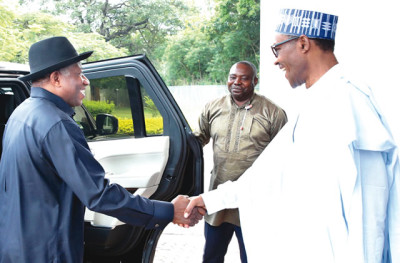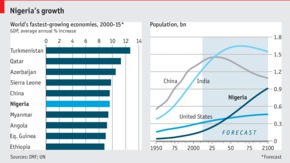THE law was laid down for Nigeria’s ministers when they were sworn into office last week. No corruption, their austere president, Muhammadu Buhari, told them. Obey the law and work together, because expectations are high. Behave in keeping with the times. Refrain from gaudy displays of wealth (“Not that some of us have much to display,” one appointee laments). It has taken almost six months for the former dictator, now elected, to install his cabinet, but for those who made the cut his message is simple: winning high office is no longer a licence to rob the public purse. Unlike many of their predecessors, the new ministers must prioritise reform.
Many observers are optimistic that they can do so. Mr Buhari’s cabinet is smaller than that of the previous president, Goodluck Jonathan, with 25 principal ministers and 12 junior ones. Several of his senior appointees have good track records. Babatunde Fashola, the respected former governor of Lagos state, has been handed a monumental portfolio combining power, public works and housing. Another ex-governor, Kayode Fayemi (pictured, left, with the president), is charged with developing mining operations as Nigeria rushes to broaden its economy away from oil. Fans of a third seasoned politician, Rotimi Amaechi, who won the transport post, say he has delivered roads despite accusations of corruption, which he denies.
Yet the president has failed to please all as he juggles the demands of his party and people. His decision to keep the oil post for himself, while appointing the Nigerian National Petroleum Corporation’s new head as his deputy, was designed to keep the valuable resource in hands he can trust. But it raises concerns over the centralisation of power. Ethnic groups of the south-east who mostly voted for Mr Jonathan in this year’s election are feeling neglected. Critics also fret over an absence of desperately needed financial expertise.
Africa’s biggest economy, which relies on oil for 70% of its revenue, is sputtering as prices fall. Economic policy has been adrift since Mr Buhari came to power, and investors complain about the central bank’s use of trade controls and import restrictions. However, the new finance minister, an accountant who cleaned up the books of one of Nigeria’s smaller states, is poorly qualified for the job. Her counterpart in the investment ministry is a respected businessman, but he may lack the clout to stand up to a president with statist leanings. “It’s a government with local professionals and without superstars,” says Shehu Sani, a senator of the ruling party.
Still, Nigerians find much to be happy about. Boko Haram, an insurgent Islamist group, has been weakened during Mr Buhari’s half-year at the helm (though bombs this week killed 43 people), and power supplies are somewhat more reliable. A bigger budget has been outlined for 2016, though it is unclear how it will be financed, and recurrent spending will be pared back. More heartening is the president’s crusade against corruption.
Staff have been fired from the state oil company and customs department. Officials are tackling smuggling along leaky borders. To reduce fraud, an opaque network of government bank accounts has been replaced by a centralised system. Several politicians, including the president of the Senate, a former oil minister and an ex-national security adviser, are under investigation. Meanwhile, biometric registration at banks should expose more money laundered by civil servants and their stooges. High-rollers are on their best behaviour. Lamudi, a property company, reports a slowdown in expensive sales, partly explained by the fact that the rich would rather not be seen splurging.




Be the first to comment